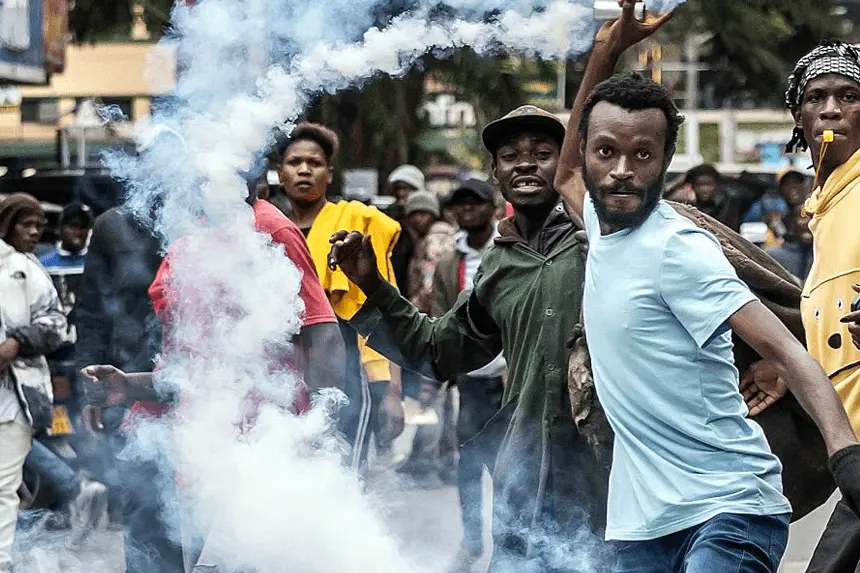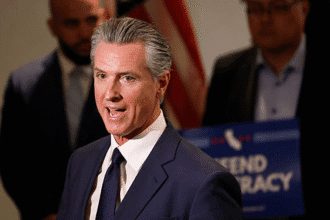Kenya’s demonstrations today are a strong wave of civic action that calls for government accountability. This is in line with the rage, frustration, and growing unhappiness of ordinary people. Tens of thousands of people protested in cities across Kenya, including Nairobi, Kisumu, Eldoret, and Mombasa, on the anniversary of last year’s fatal riots. They want what they want because they feel that their leaders aren’t listening anymore. The people in these gatherings all want the same thing: fairness, openness, and real change.
The air was thick with smoke, and the desperation of a population that wanted to be heard as riot police tried to push masses back, and tear gas filled the streets. Kenya’s youth, who were full of energy, hope, and determination to affect the future of their country, led most of these protests. The mood of the protests was set by banners held over heads, chanting of “Ruto must go,” and signs asking for systemic reform.
What did the authorities do in response to the protest movement?
In response to the protests, the government blocked off main roads leading to vital government facilities. Police cars and razor wire blocked off roads leading to the State House and Parliament. A lot of police officers in riot gear were sent to cities. The answer was strong and, in some cases, violent.
The government tried to stop live TV and radio coverage of the protests, but the High Court in Nairobi quickly rejected the order, saying that the media’s right to inform the public could not be unilaterally limited. Video from Nairobi and other cities showed streets full of angry but organized protesters who were pushing back against what they saw as the government getting too involved in their lives.
During the worst of the rioting, President William Ruto was not at the State House. Instead, he spoke to the country from a funeral in Kilifi County, which is far away from the violence in the city. He stressed the need for peace and stability throughout his speech. He told people to be calm and warned them not to use protests to break up national unity. The president’s statements were meant to calm things down, but they didn’t do anything to fix the problems that were making people go out into the streets.
What will happen because of the protests?
The uprising was really big and had a big effect. The Kenya Medical Association, the Law Society of Kenya, and the Police Reforms Working Group all said in a joint statement that at least eight people had died during the protests. More than 400 people were hurt, and 83 of them needed special care. Reports say that eight people were shot, and at least three police officers were hurt in the fights.
But the number of deaths could be far greater. Amnesty Kenya, a well-known group that fights for human rights, said that the real death toll could be as high as 16. These numbers have made people very worried about police accountability and the use of too much force against peaceful protesters. The difference between the official numbers and those given by civil society groups has made people even less trusting in the government’s openness.
After the violence, there have been increasing calls for independent inquiries into what police personnel did. Protesters, rights groups, and lawyers are all calling for justice for the victims and punishment for those who are to blame. Read another article on the Eritrea-Kenya Migration Route
What do protesters want, and why are they doing it now?
The main point of the protests in Kenya today is clear: they want the government to be held accountable, not just for the current crisis, but also as part of a long-overdue reckoning with how the country is run. Protesters are very worried about the growing gap between rich and poor, failing schools, increasing youth unemployment, and claims of corruption in government institutions.
A lot of the people who are protesting think that the current government hasn’t kept its promises. More and more people believe that the government’s policies are helping the rich while the average Kenyan struggles to meet their necessities. It’s especially scary that young people don’t have many options, since a lot of them feel cut out of both the business and the political system.
Amina Mude, one of the many mothers who came to the demonstration, gave a touching reason for being there. She said she was battling for her children’s future because she thought the country was going in the wrong direction. Her statements show a bigger truth: these protests are not just political occurrences; they are very personal for millions of Kenyans.
What Were the Protests Like on the Ground?
As demonstrators ran for shelter, tear gas filled the air between buildings in Nairobi’s central business area. But they didn’t go away easily. Protesters kept coming back together, waving flags, singing, and screaming for change. The streets, which are usually full of people doing business, were lined with closed stores and cars that had been left behind. Instead of customers and workers, committed citizens were demanding their rights.
Outside the gates of Parliament, protesters put up flowers and handwritten letters to honor the people who died in last year’s protests. These public memorials were a strong reminder that the quest for justice is far from ended. A young woman in the audience held a big sign with the names of the people who died in 2024. She was draped in the Kenyan flag. Her quiet complaint said a lot about how serious and urgent the situation was.
Every movement, chant, and step taken by the demonstrators was part of a bigger call to action. And at the center of it all is the basic message that the protestors in Kenya today want the government to be held accountable.
What Happens Next for the Country?
Kenya is at a really important point right now. The protests have shown that there are profound divides and pressing problems that can’t be ignored any longer. The administration has to choose between responding with meaningful engagement or sticking to tough approaches. There is a chance to change the way people and their leaders get along, but only if the people on the streets are really heard.
It won’t be easy to make changes. It will take political will, conversation, and a real desire to change. People want to see more openness in how the government spends money, changes in how the police work, and more attention paid to education and jobs for young people. They want people to be responsible, not just in words but also in actions.
The unrest is likely to keep going if these problems aren’t dealt with seriously. But if leaders act boldly now, the country might advance toward a future that is fairer, positive, and open to everyone.
The End
In every city and town where there were protests, the message was clear: the Kenyan government has to be held accountable. This is a time that will shape the future of the country. Kenya’s people are not protesting only because they are angry; they are doing it because they love their country and want to make it better. What happens next will not only affect Kenya’s stability now, but also its future.








